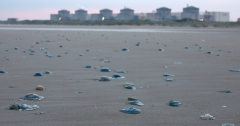Scientists say warmer waters in the North Sea due to climate change have created conditions allowing jellyfish to thrive and reproduce.
Published On 12 Aug 2025
Four reactor units at one of France’s largest nuclear power stations have been forced to shut down due to a swarm of jellyfish in the plant’s water pumping stations, French energy group Electricite de France (EDF) said.
Three reactor units were automatically shut down on Sunday evening at Gravelines on the English Channel, followed by the fourth early on Monday morning, EDF said, adding that the safety of the plant, its employees and the environment was not at risk.
“These shutdowns are the result of the massive and unpredictable presence of jellyfish in the filter drums of the pumping stations,” EDF said in a statement.
The plant in northern France is one of the largest in the country and is cooled from a canal connected to the North Sea.
Teams were carrying out inspections to restart the site “in complete safety”, EDF said, adding the reactors that were shut down are expected to restart on Thursday.
The beaches around Gravelines, between the major cities of Dunkirk and Calais, have seen an increase in jellyfish in recent years due to warming waters and the introduction of invasive species.

The Bulletin of the Atomic Scientists wrote in 2021 that jellyfish swarms incapacitating nuclear power plants is “neither new nor unknown” and there was substantial economic cost due to the forced closure of power plants.
Scientists are currently exploring ways to avert closures due to sea swarms, including using drones to map the movement of jellyfish, which would allow early intervention.
“Jellyfish breed faster when water is warmer, and because areas like the North Sea are becoming warmer, the re





